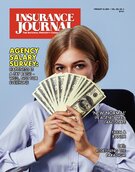Based on my reading, most employers appear to prefer employees to be in the office. And yet, most white-collar employees seem to prefer working from home, at least for a material portion of the time. Quite a conundrum exists, and I’ve had many agency owners and even carriers ask for advice on how to manage this situation.
Specific to insurance agencies/brokers, working from home is a negative on many levels. Regardless of how simple insurance advertisements make insurance seem, the reality is insurance is an extremely complex industry. Complex and, excluding actuarial, formal education does not really exist relative to the real-world work environment. Agents are selling legal contracts, hopefully, though not always, designed to protect the most valuable tangible assets people, companies, governments, and non-profits own. This includes liability coverage, which protects the very tangible asset of cash and other assets that can be converted to cash to pay for the defense attorneys and judgements.
No two insured assets are exactly the same. No two insureds are exactly the same. A “simple” homeowners policy if only offered by one standard, admitted carrier has around 25 million permutations of coverage. Absolutely nothing is simple about a product that has 25 million different combinations of coverage.
The attorneys writing these policies were trained in law. The account manager checking the policies is likely trained in-house. Work-from-home makes training on how to read legal contracts, how to correctly combine different coverages, and how to complete policy checks extremely difficult, if not impossible, to achieve at an adequate level because in addition to the complexity, nothing is ever the same twice. To best address these complexities, insurance people have historically been trained in-house and on-the-job.
The environment is actually even more complex because of the complete lack of standardization between carriers, brokers and forms, and even the lack of consistency within the agency and the carrier. The lack of standardization goes even further when situations where producers get to “customize” procedures, aka, cut corners are added to the mix. A new person working by themselves has no reasonable way of knowing how to deal with these situations and producers will take advantage, ultimately resulting in more E&O claims. The same reality goes for marketing reps and underwriters.
I am amazed at how much knowledge the top insurance people possess. They’ve gained this knowledge and skills over time and with considerable self-effort, not institutional effort. No formal training exists that comes close to replicating real-world situations and underwriting experience (although just saying “no” is fairly easy to teach).
My experience is that E&O claims have been increasing since the beginning of the huge increase in work-from-home employees. These claims might not appear in the official E&O frequency claims charts because quite a few of these claims are being paid out of pocket, for better and worse.
Training someone at a distance in the middle of the hardest market in probably at least 40 years is even worse because the intensity, urgency and complexity are all climbing. I was trained in the last hard market and thinking back, so much went over my head specific to a hard market that I’m not sure how I made it, other than I truly had wonderful people backing me up.
E&O increases in the work-from-home environment for many reasons, including producers finding ways to cut corners and the lack of adequate training. When everyone is sitting together, a natural check and balance environment is created. A natural but informal training program evolves simply through constant interaction and even overhearing other conversations. These are valuable realities.
From an E&O defense perspective, I suspect agents are digging deeper holes because all the work-from-home communication will be in writing, including items that would have been more safely communicated verbally. These items would have been communicated verbally in an office because someone would have risen from their chair and walked over to the other person to talk through the situation.
Regardless of these risks, I suspect some level of work-from-home is here to stay, and perhaps some of the benefits of work-from-home have yet to be fully recognized. Once office leases expire, offices should be downsized enough to save the equivalent of a salary or two, and to pay for extra E&O expenses.
Another benefit for leaders and managers who want to improve their skills is to learn to manage people by their skills and results rather than whether you like them, whether they work long hours and rather than simply managing by walking around. If you want this challenge, be sure to include the following points in your strategy:
- Greatly increase your employee training, including:
a. Better coverage training. Run-of-the-mill CE qualified training is inadequate. Invest in quality training.
b. Better communication skills.
c. Better management system training.
d. Better training on the agency’s/carrier’s procedures. - Better procedures. Most agency and carrier procedures are materially lacking. Work-from-home requires high quality, comprehensive procedures. This includes a user-friendly procedures manual. I’ve reviewed dozens and dozens of procedures manuals. Most are written as if the goal was to provide a sleep aid. Procedures manuals are instruction manuals. The best people to write a procedures manual are those actually doing the job. The manual should also be a living document. When training new employees, learn where they get hung up and then fix the procedure.
- Add a robust quality control position because procedures are only good if people follow them. Especially with work-from-home, people are going to vary from the procedures whether on purpose or unintentionally. This is why branch offices have historically had higher E&O claims than main offices, all else being equal.
Work-from-home lacks natural checks and balances and adequate training. Quality control is the only way to identify these inevitabilities.
I am a fan of file audits rather than desk audits because a file audit addresses everyone that touches a file rather than focusing on one desk. It is simultaneously less threatening and more comprehensive.
Work-from-home at some level or another is here to stay. A compromise between employees and employers will be discovered through real world back and forth experiences.
To make it work, employers must improve their management skills and their organization’s procedures. These recommendations will provide a foundation for achieving that goal.
Was this article valuable?
Here are more articles you may enjoy.



 Insurance Broker Stocks Sink as AI App Sparks Disruption Fears
Insurance Broker Stocks Sink as AI App Sparks Disruption Fears  Insurify Starts App With ChatGPT to Allow Consumers to Shop for Insurance
Insurify Starts App With ChatGPT to Allow Consumers to Shop for Insurance  Nine-Month 2025 Results Show P/C Underwriting Gain Skyrocketed
Nine-Month 2025 Results Show P/C Underwriting Gain Skyrocketed  BMW Recalls Hundreds of Thousands of Cars Over Fire Risk
BMW Recalls Hundreds of Thousands of Cars Over Fire Risk 



